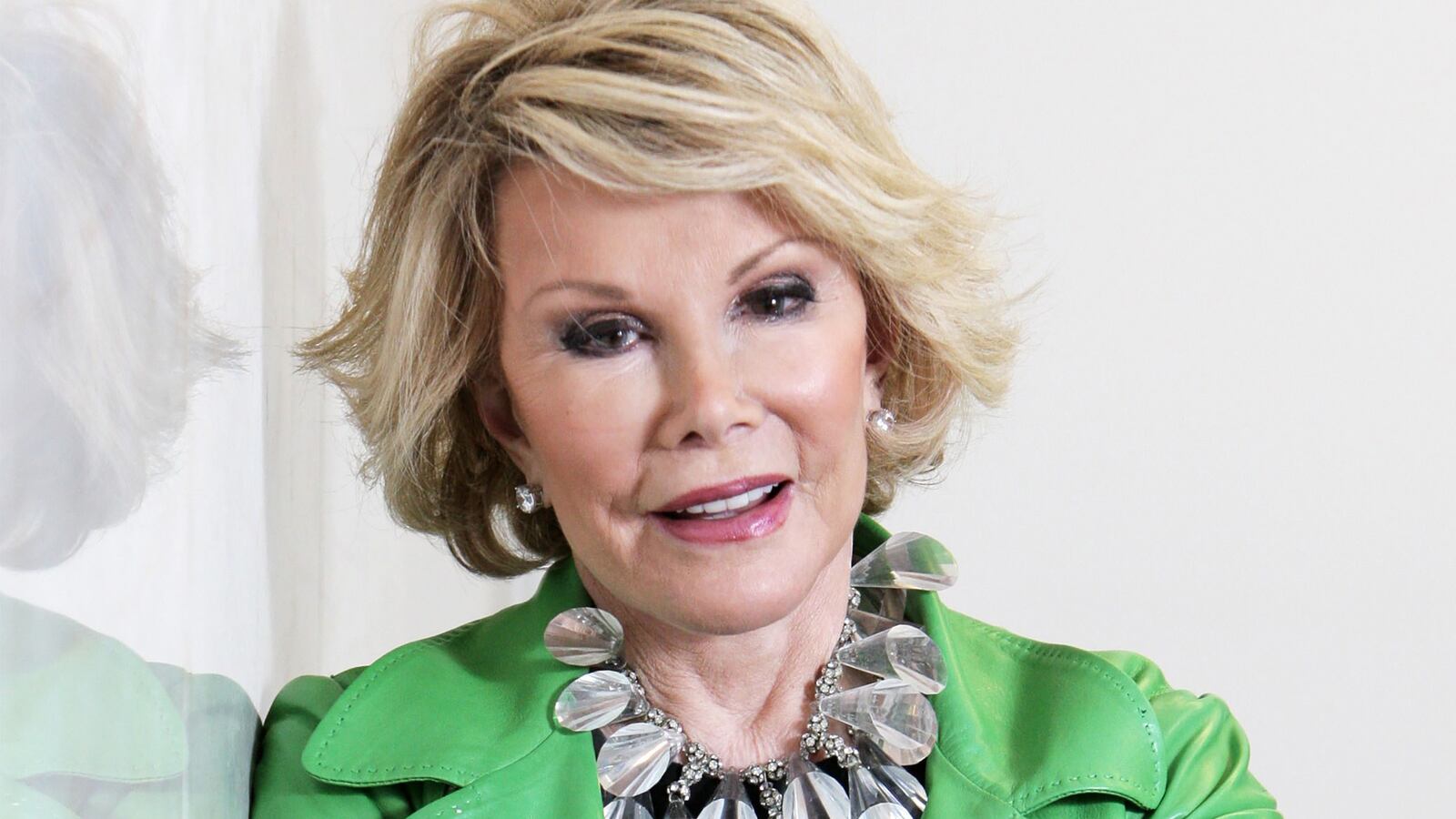Joan Rivers’s penthouse apartment on Manhattan’s Upper East Side was so fancy that the elevator deposited the visitor right into it—no foyer, no corridor of doors to choose hers from.
You were whizzed from the ground floor straight into Rivers-land, in all its sumptuous, golden, glittering, mini-Versailles splendor. It had a sweeping staircase and its own ballroom.
Rivers died, aged 81 on Sept. 4, 2014, and now Christie’s in New York is holding an auction on June 22 in New York, featuring 200 lots encompassing the breadth of her “exceptional and eclectic taste, including decorative arts, paintings, fine French furniture and Fabergé.” Estimates will range from $500 up to $200,000.
The live sale of Rivers’ possessions will coincide with an online auction of 80 lots selling “extravagant costumes made by Bob Mackie, couture and personal jewelry spanning esteemed design houses such as Cartier, Van Cleef & Arpels and Harry Winston.”
Christie’s did not return requests for clarification on further items for sale, or how it had been curated and by whom, by press time.
In the last major interview Rivers gave, conducted with me for The Daily Beast just over a month before she died, she said, “I’ve left money so the dogs can be taken care of. I’ve said to [her daughter] Melissa, ‘Sell anything and everything you don’t want. Don’t feel beholden to my possessions.’ I feel almost hysterical on that. I don’t want them to have a sense of guilt.”
Rivers loved holding parties amid the delightful, far-from-tasteless opulence of her apartment.
When I arrived to interview her there in 2010 for the London Times, she was on the phone, raspy voice on maximum volume, barking at a producer of the then-yet-to-air Joan and Melissa that they’d have to reshoot an argument between her and her daughter, as it hadn’t been vituperative enough.
She sure knew showbiz, and this glittering apartment was an emphatic emblem of it.
The apartment was sold in 2015 for $28 million to the Saudi Prince Fahd, who set about gutting it.
Gone, reportedly, is all that gilt, swag, and unrepentant, utterly owner-appropriate glitz.
In a statement, Christie’s said: “Among the personal objects, which reflect Joan’s connoisseurship of fine and decorative arts and her sense of wit and humour, include a beautiful Edouard Vuillard painting, Dans L'Atelier, painted circa 1915, (and) a jewelled nephrite study of a Lily of the Valley leaf by Fabergé.”
A portion of the proceeds will benefit both God’s Love We Deliver and Guide Dogs for the Blind.
Also among the personal objects to be auctioned is a silver Tiffany & Co. water bowl engraved “for Spike,” her beloved dog who, she told me in July 2014, had saved her own life when she contemplated suicide after the suicide of her husband, Edgar Rosenberg, in 1987.
“It was about eight months later. Melissa wasn’t talking to me, my career was in the toilet, I’d lost my Vegas contracts, I’d been fired from Fox [where she had a talk show]. Carson and NBC [she had appeared on the Tonight Show for years] had put out such bad publicity about me. I was a pariah. I wasn’t invited anywhere. I was a non-person. At one point I thought, ‘What’s the point? This is stupid.’
“What saved me was my dog jumped into my lap. I thought, ‘No one will take care of him.’ It wasn’t a friendly dog—only to me. I adored this dog. He was theoretically a Yorkie, his mother cheated. His name was Spike. He was the way you want your dog to be, devoted only to you.
“I was sitting in this big empty house in Bel Air, with a phone with five extensions which we no longer needed. I had the gun in my lap, and the dog sat on the gun. I lecture on suicide because things turn around. I tell people this is a horrible, awful dark moment, but it will change and you must know it’s going to change and you push forward. I look back and think, ‘Life is great, life goes on. It changes.’”
Rivers was unapologetically in love with luxe. The apartment had—as I discovered when I interviewed Rivers there—cream pillars, richly embroidered drapes, cushions, and a regal red-and-gold color scheme.
As she told me: “This is how Marie Antoinette would have lived if she’d had money.”
We sat in her study. Rivers was a voracious reader, and her bookshelves were lined with political tomes about Republican icons such as Abraham Lincoln, Colin Powell, and Richard Nixon, alongside art books on de Kooning, Seurat, and Manet. A butler bought brownies on a silver platter.
The sofa and chairs had cushions with homilies such as: “Never economize on luxuries” and “It’s lonely at the top. You just eat better.”
A grandfather clock played whimsical Scottish tunes on the hour, which Rivers could not name beyond “Bonnie bonnie, Tam o’ Shanter.”
When I asked Rivers what she cherished most in this glamorous pad, she indicated family photographs of Edgar, Melissa, and Melissa’s son, Cooper.
Rivers movingly expressed her love for both Melissa and Cooper in conversation. She told me twice—once in 2010, and again in 2014—that she only worried about her dying in how it would affect Melissa.
As wickedly funny off stage as well as on, the quieter Rivers was also wry, intelligent, and kind; she loved her family deeply and fiercely, and wanted to protect them—and ensure they had as secure and happy a life as possible—after she died.
That love, and the love Rivers’s many friends had for her, was acutely visible at her funeral—a perfect mix of laughs, tears, memories, wonderful stories and testimonials, and stirring music--which I was fortunate enough to attend.
If you have seen the brilliant documentary about Rivers, A Piece of Work, you’ll know she worked as hard as any jobbing comic; the finery she surrounded herself with—the contents of the Christie’s auction—was the result of stubborn, hard work.
“I have no riches,” Rivers insisted to me when we met a few weeks before she died.
Come on, Joan, you are quite well off, I said.
“No, I’ve always been salaried,” she replied. “I’ve never owned anything. I’ve done very well, lived very well… Sweetheart, I’m still working at Indian casinos in Omaha.”
You seem terrified of not working, I said.
“With comedians, you’re as good as your last joke,” she said.
Where does the fear come from?
“It being over, and I can’t get a job in Macy’s selling hats,” she shot back.
You could live off your money, I suggested.
“I don’t have money to do that,” Rivers said. “I could pull my living in and live OK, but I don’t want to live OK. I’m very happy to live in my penthouse, very happy I can pick up a check, very happy to have a great life, and be able to spread my wealth a little bit.”
The one object of intrigue to this reporter is less all the obvious glitz, but a piece of furniture Rivers showed me on my 2010 visit to her apartment: a modest dresser whose drawers contained all of Rivers’ jokes, meticulously catalogued. Perhaps—one hopes at least—Melissa and Cooper have that.






